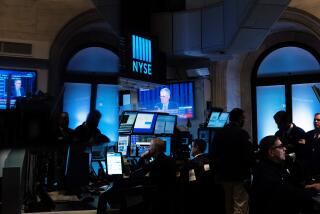More Fuel for the Buy-and-Hold Idea
- Share via
Just because you can trade a stock cheaply and easily doesn’t mean you should. Updated research bolsters the notion that the more rapidly you buy and sell shares, the worse you are likely to do.
Brad Barber and Terrance Odean, both UC Davis professors, studied the trading records of 78,000 households with discount brokerage accounts from 1991 through January 1997. They found that most of these households traded frequently, turning over an average of 75% of their portfolios every year.
These frequent traders spent a lot on commissions: The average $1,000 round trip in and out of a stock cost the investor 3% in commissions and 1% in the bid-ask spread of the stock.
The researchers found that most investors tended to sell stocks that went on to do better, while they held onto their losers, a practice that could be based on careful methods of stock valuation but is more likely to be based on self-defeating emotional reasoning.
The bottom line? Before commissions and other trading costs, the average discount brokerage investor beat key market indexes by less than 1 percentage point. Subtract all of the trading costs, though, and the stocks of that same investor underperformed market indexes by an average of 1.3 percentage points.
The most active traders--those that turned over more than 8.8% of their portfolios every month--cost themselves more than 6 percentage points in returns; their net returns were 11.4%, compared with the average index returns of 17.9%.
It should be noted that Odean and Barber did not take tax consequences into account in their study; taxes, of course, can have a significant effect on an investor’s returns as well.
The trading costs in the study period were before the online price wars that have dropped the price of trades to under $30, and in some cases under $10. But the moral of the story still applies.
The TV commercials with island-owning tow-truck drivers notwithstanding, you can do yourself more harm than good if you trade frequently, whether you do it online or over the phone or in person at your broker’s office. And if the research results are this discouraging in a bull market, it’s likely you could hurt yourself worse with rapid trading in a bear market.
More to Read
Inside the business of entertainment
The Wide Shot brings you news, analysis and insights on everything from streaming wars to production — and what it all means for the future.
You may occasionally receive promotional content from the Los Angeles Times.










